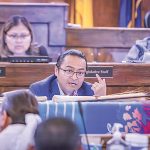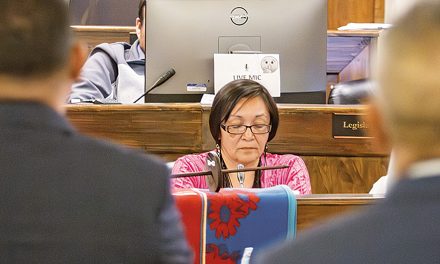
Application set for Nov. 2; elders, persons with disabilities are priority
WINDOW ROCK
The anxiously awaited online application portal for COVID-19 hardship assistance is scheduled to open Nov. 2.
In a KTNN leadership forum last Friday, Controller Pearline Kirk also said that they are planning to open the paper (hard copy) application process next week for elders 65 and above and those with special needs or disabilities, providing them a one-week head start.
The Hardship Assistance Program will provide emergency COVID-19 payments to enrolled tribal members in the amount $1,500 for adults (18 and above) and $500 for minors, per the Navajo Nation Council resolution which added $49 million to the CARES Act Fund Hardship Assistance Expenditure Plan.
Per an amendment that was approved by the Budget and Finance Committee, anyone 65 and older and those with special needs or disabilities will receive priority in the distribution of the funds.
Delegate Carl Slater clarified that enrolled tribal members will need to self-certify that they have experienced some type of financial hardship due to the COVID-19 pandemic, whether due to lost income or increased expenses, by checking application boxes.
No supporting documentation or explanation will be required to substantiate hardship in order to qualify. “That is acceptable to the U.S. Treasury and everything is consistent with federal guidelines,” said Slater. Delegate Eugenia Charles-Newton explained that leadership and the controller’s office did their best to create a very simple application that should be easy to get through.
By submitting an application, tribal members will also have to agree to use the payments to cover losses and expenses related to the COVID-19 pandemic, such as rent, mortgage, utilities, child care, health care, PPE, food, fuel, livestock, and funeral expenses. “This is not a stimulus or a per cap (per capita payment),” said Charles-Newton. “This is a hardship assistance. I believe most everybody, if not all of all of our people, have experienced hardship relating to COVID-19 pandemic.”
As a public service, the Navajo Times is making all coverage of the coronavirus pandemic fully available on its website. Please support the Times by subscribing.
How to protect yourself and others.
Why masks work. Which masks are best.
Resources for coronavirus assistance
Application portal
Kirk said the online application portal will be a secured site and they will be verifying Certificate of Indian Blood data with the Office of Vital Records. Those applying for hardship assistance are encouraged to confirm their enrollment with the office and register to vote with their chapter at the Elections Office. “These CARES dollars are similar to disaster assistance payments, so there is no taxability,” said Kirk. “In terms of who can apply, it doesn’t matter if you’re living on-reservation or off-reservation, as long as you have a CIB number.”
The electronic application process is scheduled to open up through the online portal on Nov. 2 on the controller’s website, and close Nov. 30, she said. “We are hoping to have assistance available through the chapters or other locations, similar to when you vote,” said Kirk.
Kirk urged family members, chapters and senior citizens center staff to help elders apply. During the month of December, the payments will be distributed via printed checks. “The main goal is that the Nation expends all of the CARES funding that we received from the federal government,” said Kirk.
Reallocating unspent funds
Slater said while only $49 million is currently available in the hardship assistance fund, any unspent, unobligated money for Navajo CARES Act projects that may not be completed by the Dec. 30 may be added to the hardship fund.
This will be evaluated by the Budget and Finance Committee in consultation with executive branch directors at the end of October and any fund transfers will have to be approved through Naabik’iyati’ Committee resolution. It is therefore more than likely that there will be a larger pot of money to distribute since many funds currently remain unspent and unobligated.
“Giving the people the money was the only logical step in making sure this money does not go back to Washington, D.C.,” said Charles-Newton. “I’m going to ask the Navajo people to please have hope and continue to pray that these funds will go back into the hardship and that every single Navajo person will receive some type of assistance.”
As of Wednesday, only $164.5 million of the $714 million in appropriated Navajo CARES Act funds have been spent. “There are many projects funded by CARES Act funds but there is no time to complete them and the compliance reporting is extensive,” Kirk said in a press release. “We need to spend the funds quickly and we need to sweep our efforts into expending Hardship Assistance Project funds and provide much-needed funds to the Navajo people.”
If all 327,726 enrolled Navajos were to receive the $1,500 payments for adults and $500 for children that would cost an estimated $396.5 million, per the controller’s office. Kirk stated there is “widespread support” from enrolled members of the Navajo Nation and the controller’s office to add additional funds to the Hardship Assistance Program based on actions of the Navajo Nation Council.
“We know this hardship assistance comes with a great toll on our people from the impact of COVID-19 mentally, spiritually, and physically,” said Delegate Amber Kanazbah Crotty. “It has taken a part of us that we are trying to restore.”








 Highway 264,
Highway 264, I-40, WB @ Winslow
I-40, WB @ Winslow